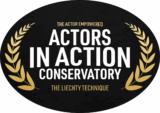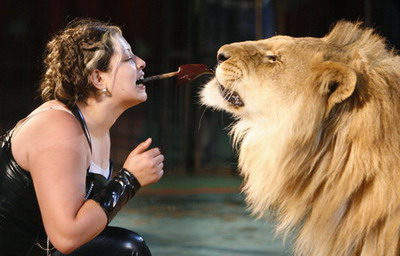Actor Trainer? Like a lion trainer? What do you do, get them to jump through a ring of burning scripts?
That’s what a comic said to me when I told him what I do.
One Day In October
I opened the doors on my acting school – ACTORS IN ACTION: Professional Acting Conservatory. It didn’t feel as grand as all that. I was actually terrified. Would anyone show up? Would the process I wanted to t each which worked so well for me work for others? Would I actually be able to teach it?
Wednesday October 14th, 2015 I walked into The Sue Rowe Studios at 6:30 pm to teach the six people who had signed up and my life changed forever. And for the better.
I had been acting professionally for thirty years (I started young ;), had a BFA in Acting from DePaul University’s Theatre School in Chicago, had worked in NYC, LA and regionally, had had my own theatre company, my own fledgling film production company, and had dabbled in private coaching and teaching before, but this time I did it in earnest. Tired of working dead-end jobs while I auditioned and got my own projects off the ground, I decided to use my talents and training to help better the pool of actors around me.
My Training
DePaul’s Theatre School curriculum proved pretty eclectic, we studied a lot of Stanislavski, Effort-Shape Movement, Linklater and Lessac voice work, Alexander technique, some Jerzy Grotowski, a bit of Meisner, Bella Itkin’s Sensory Response System, some Uta Hagen, the list could go on.
When I graduated and headed off to NYC I had somewhat of a process heavily influenced by what I’d learn. However, I just couldn’t pull my auditions together to get any serious bookings, although due to the agent I’d landed out of school, I did blow some pretty amazing opportunities.
Baffled, I realized I needed to streamline my process. It needed to get me to the heart of the role I was playing and allow my own heart to be fully accessible. The joining of two hearts was the goal. So I kept studying. I took classes in New York. When I moved to LA I took more, including studying Meisner at Playhouse West with Jeff Goldblum. By myself I kept working on script analysis. With like-minded actor friends I workshopped auditions, always looking for a way to be more specific, truthful and in the moment.
My Method
After years of a lot of effort, I finally came up with my process. I later learned it was very much in the school of “Practical Aesthetics” that is mapped out by David Mamet in The Practical Handbook for the Actor. This method is based on understanding the Structure of Drama. It demystifies script analysis, giving it a practical focus. This gives the actor vital clues into the world of the film/play and into the heart of the character.
Armed with this knowledge, an actor can make specific, playable choices that allows them to fully inhabit their role. It allows them to access their inner life and behave honestly in imaginary circumstances. Mamet certainly did not come up with the idea himself, this way of working originated from theatre masters such as Stanislavski, Meisner, Uta Hagen and Stella Adler.
And it’s the approach I take when I train my actors. I say train, because it’s not just teaching, it’s showing them how to connect, to break down a scene, experiencing the kinesthetics of playing a verb, to check to see if they are getting what they want from their partner. It’s not just talking about how to act, it’s doing it.


